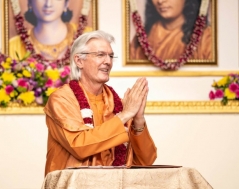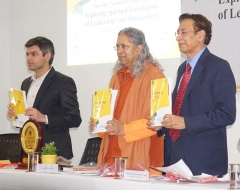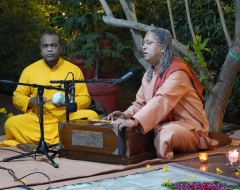Recognizing once again the spiritual stature and contributions of one of the immortal sons of India, our Gurudeva Sri Sri Paramahansa Yogananda, the Government of India has decided to commemorate his 125th Birth Anniversary. It will take up various programmes to honour and commemorate Paramahansa Yoganandaji’s 125th birth anniversary with the help of Yogoda Satsanga Society of India (YSS). [Read more by clicking here.]
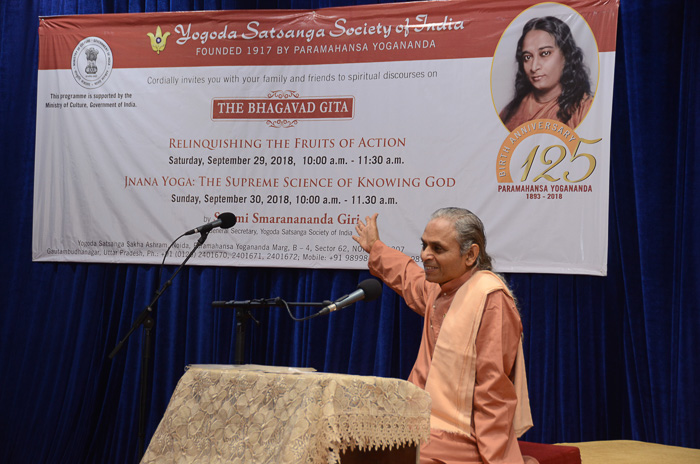 As part of this initiative, YSS Noida Ashram recently hosted a two-day Gita Discourse by YSS General Secretary Swami Smarananandaji on September 29 and 30, 2018. The discourses expounding the 'Wisdom of the Bhagavad Gita' were the highlights of the four-day extended retreat conducted at YSS Noida Ashram from September 27 to 30. On the first day, Swamiji spoke on Relinquishing the Fruits of Action, while Jnana Yoga: the Supreme Science of Knowing God was the topic on the second day.
As part of this initiative, YSS Noida Ashram recently hosted a two-day Gita Discourse by YSS General Secretary Swami Smarananandaji on September 29 and 30, 2018. The discourses expounding the 'Wisdom of the Bhagavad Gita' were the highlights of the four-day extended retreat conducted at YSS Noida Ashram from September 27 to 30. On the first day, Swamiji spoke on Relinquishing the Fruits of Action, while Jnana Yoga: the Supreme Science of Knowing God was the topic on the second day.
Relinquishing the fruits of Action
On the first day of the discourse on the Bhagavad Gita, Swami Smarananandaji shared the learnings from the second chapter of the great ancient scripture (II:47-51).
“Relinquishing the fruits of action” is one of the noble concepts of Indian philosophy, having a deep spiritual significance, he explained.
An ordinary person cannot grasp the full import of this principle. He would only wonder if I am to relinquish the fruits of action, why not relinquish the action itself and the consequent problems!
A spiritual person, on the other hand, realizes that God is the Doer. He has to play a small part in the Cosmic Play. Willingly and cheerfully the devotee would continue to play whatever role is assigned to him.
The benefits of “relinquishing the fruits of action” are available both “here” and “hereafter.”
Here, freedom from anxiety and hence peace of mind. God takes the responsibility as a father does for his obedient son.
Hereafter, no karmic bindings for a person who works to please God.
Results anyway follow an action.
Bhagavan Krishna explained this noble principle to Arjuna in the Bhagavad Gita, especially in Chapters II and III. Sri Sri Paramahansa Yoganandaji gave a detailed interpretation of the same in his book God Talks With Arjuna. His interpretation covers the material, psychological, and spiritual aspects of one’s life.
In his discourse, Swamiji explained the following:
- How selfish action, withdrawal from the action and spiritually liberating action differ
- Finding one's God-given role in life
- Principles of right action interpreted esoterically
- Mental evenness that is the result of the communion of the mind with Spirit
- Yoga is the art of proper action
- The purpose of God's plan for man is not an endless series of rebirths
Jnana Yoga: the Supreme Science of Knowing God (Chapter IV, Slokas 1-8)
On the second day of his Gita discourse, Swami Smarananandaji spoke on "Jnana Yoga: the Supreme Science of Knowing God."
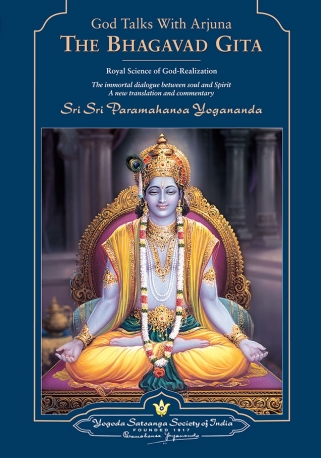 Swamiji shared that Gurudeva Sri Sri Paramahansa Yoganandaji gave a detailed and unique interpretation of the 4th chapter of Bhagavad Gita, Jnana Yoga, in his book God Talks With Arjuna.
Swamiji shared that Gurudeva Sri Sri Paramahansa Yoganandaji gave a detailed and unique interpretation of the 4th chapter of Bhagavad Gita, Jnana Yoga, in his book God Talks With Arjuna.
The first two slokas of the 4th chapter proclaim the historical antiquity of Raja ("royal") Yoga, the eternal, immutable science of uniting soul and Spirit. At the same time, understood esoterically, they give a concise description of that science -- the steps by which the soul descends from Cosmic Consciousness to the mortal state of identification with the human body, and the route it must take to reascend to its Source, the all-blissful Eternal Spirit.
In summary, yoga signifies the union of Spirit and soul. The Spirit, as Cosmic Consciousness, is united to omnipresent Cosmic Energy, which is linked to the microcosmic spiritual eye of life and consciousness in man. Life and consciousness are linked to the mind. The mind is linked to the astral eye and the intuitive mind of the astral body. And astral life and mind are linked with the five sensory instruments of knowledge.
Interpreting the slokas IV:7 and 8, Paramahansa Yoganandaji says that this earth is a stage whereon a divine drama is being evolved. Whenever the majority of human actors misuse their God-given freedom, and by the creation of evil bring suffering and upset the divine plans concerning their fellow beings and their own destiny (plans intended to be carried out by man's proper use of free choice), then God, the Cosmic Director, appears on the stage in a human form (an avatar) to instruct the amateur thespians in the proper art of living. God thus teaches man, made in His image, how to evolve by using free will, manifesting the divine nature inherent in the human nature.
As the sloka IV:8 is often translated to refer to "the destruction of evildoers," and as many legendary stories in the Puranas also cite the annihilation of the wicked by holy beings, certain theologians claim that a Hindu incarnation of God comes to protect the virtuous by destroying evildoers, in contradistinction to Jesus Christ who came on earth to liberate not only virtuous men but malefactors! However, the truth is that virtue always causes the destruction of evil.
Swami Smarananandaji explained that an avatar does not necessarily incarnate to annihilate a wrong-doer. He could come on earth just to help devotees destroy the ignorance within them. For instance, Paramahansa Yoganandaji taught Kriya Yoga to liberate oneself.
The 90-minute discourses were attended by more than 600 people on the first day and over 800 people on the second day. All attendees were served Guru Langar.

